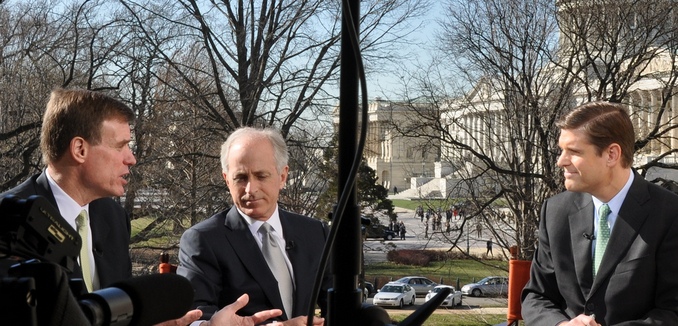Sen. Bob Corker (R – Tenn.), chairman of the Senate Foreign Relations Committee, sent a letter to President Barack Obama, criticizing his administration for their “breathtaking” retreat from their “original goals and statements” at the beginning of nuclear talks with Iran, The Hill reported today.
“It is breathtaking to see how far from your original goals and statements the P5+1 have come during negotiations with Iran,” Corker (R-Tenn.) said in the letter, referring to a group that includes the U.S., the United Kingdom, China, France, and Russia plus Germany.
Corker said negotiators “have moved” from a trying to strike a 20-year agreement, to a 10-year one and seem ready to let Tehran continue to develop its ballistic missile effort and maintain research and development for advanced nuclear centrifuges.
“I understand the dynamics that can develop when a group believes they are close to a deal and how your aides may view this as a major legacy accomplishment. However, as you know, the stakes here are incredibly high and the security implications of these negotiations are difficult to overstate,” Corker warned.
In the full text of the letter, available on his website, Corker provided more details of his criticism.
I am alarmed by recent reports that your team may be considering allowing the deal to erode even further. Only you and those at the table know whether there is any truth to these allegations, and I hope reports indicating potential concessions on inspections and on the full disclosure of Iran’s possible military dimensions (PMDs) are inaccurate.
Regarding inspections, surely your administration and those involved in the negotiations will adhere to an “anytime, anywhere” standard. No bureaucratic committees. No moving the ball. No sites off limits.
You have publicly acknowledged Iran’s long history of covert nuclear activity. We all are aware of the importance of having a full understanding of Iran’s nuclear program, including PMDs of those activities as part of any agreement. Yet, recently I have heard of a potential cumbersome process where the International Atomic Energy Agency (IAEA), with no confirmation from Iran, will make PMD determinations about Iran’s nuclear program in order to protect Iran’s national pride, meaning Iran will not have to publicly admit to these activities. Today, the IAEA cannot get access to information Iran agreed to share pursuant to a 2013 agreement. By not requiring Iran to explicitly disclose their previous weaponization efforts on the front end of any final agreement, we will likely never know, in a timely fashion, the full extent of Iranian capabilities.
Tablet magazine published a critique Monday written by former Defense Department official Matthew Kroenig, who called the administration’s willingness to allow Iran to maintain its capacity for uranium enrichment a “retreat” from America’s 70-year-old bipartisan nonproliferation policy.
Last month, legislation coauthored by Corker requiring the president to submit any nuclear deal with Iran to Congressional review was signed into law after overwhelming approval by both the Senate and the House of Representatives.
[Photo: Mark Warner / Flickr ]




